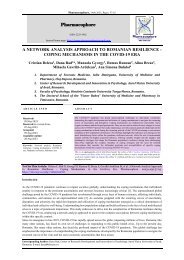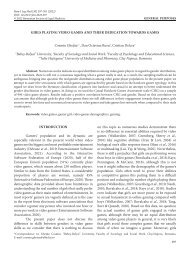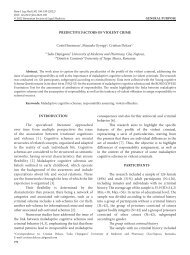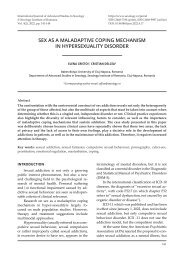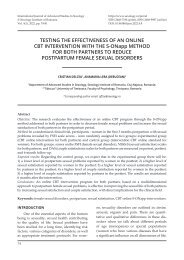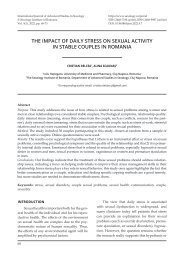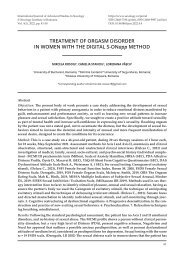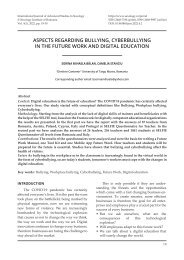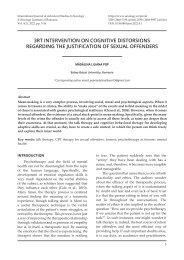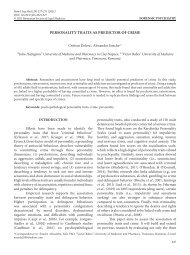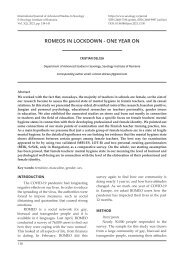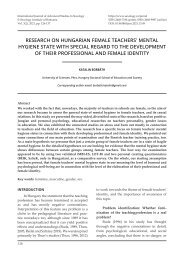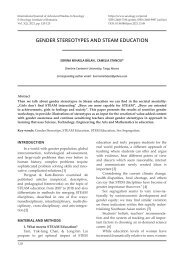SYMPTOMATOLOGY OF RECONSTITUTION OF TRAUMA IN ADULTS WITH A HISTORY OF CHILDHOOD SEXUAL ABUSE. AN APPROACH FROM THE PERSPECTIVE OF SONapp APPLICATION
Adults with a history of childhood sexual abuse often experience symptoms derived from lived traumatic experiences, which are analogous to many of the criteria of diagnosis of Borderline Personality Disorder (BPD) but also with those of stress disorder post-traumatic stress disorder (PTSD). We will briefly examine these symptoms in the context of a framework trauma, to conclude later whether symptomatic behaviors may be indicative more accurate for a post-traumatic response, especially in terms of behavior reconstitution or re-experience of trauma. Recognition of self-harm behavior or masochistic tendencies in adult survivors of sexual abuse trauma as an attempt to reconstitution of sexual trauma suffered in childhood, rather than as a manifestation characteristic of personality disorders, serves to establish an appropriate diagnosis, mental health professionals can continue to focus on the consequences of trauma unresolved sexual issues rather than personality restructuring. (Standardized intervention model SON, Delcea C., 2019) Thus, seek to We understand clients in a trauma setting can provide a more objective treatment climate and can minimize the stigma that may result potentially from making an inappropriate diagnosis borderline personality disorder (BPD).
Adults with a history of childhood sexual abuse often experience symptoms derived from lived
traumatic experiences, which are analogous to many of the criteria of diagnosis of Borderline Personality
Disorder (BPD) but also with those of stress disorder post-traumatic stress disorder (PTSD). We will
briefly examine these symptoms in the context of a framework trauma, to conclude later whether
symptomatic behaviors may be indicative more accurate for a post-traumatic response, especially
in terms of behavior reconstitution or re-experience of trauma. Recognition of self-harm behavior
or masochistic tendencies in adult survivors of sexual abuse trauma as an attempt to reconstitution
of sexual trauma suffered in childhood, rather than as a manifestation characteristic of personality
disorders, serves to establish an appropriate diagnosis, mental health professionals can continue to
focus on the consequences of trauma unresolved sexual issues rather than personality restructuring.
(Standardized intervention model SON, Delcea C., 2019) Thus, seek to We understand clients in a
trauma setting can provide a more objective treatment climate and can minimize the stigma that may
result potentially from making an inappropriate diagnosis borderline personality disorder (BPD).
You also want an ePaper? Increase the reach of your titles
YUMPU automatically turns print PDFs into web optimized ePapers that Google loves.
RODICA WEIHM<strong>AN</strong>N<br />
personality disorder. American Journal of<br />
Psychiatry.<br />
16. Herman, J. (1999). Trauma and recovery: The<br />
aftermath of violence from domestic abuse to<br />
political terror. New York: Basic Books.<br />
17. Herman, J. L., Perry, C., & van der Kolk, B.<br />
A. (1989). Childhood trauma in borderline<br />
personality disorder. American Journal of<br />
Psychiatry.<br />
18. Delcea C., Enache A., (2021). Personality Traits<br />
as Predictor of Crime. Rom J Leg Med [29] 2,<br />
227-231 [2021] DOI: 10.4323/rjlm.2021.227.<br />
19. Herman, J. L., & van der Kolk, B. A. (1987).<br />
Traumatic antecedents of BPD. In B.A. van der<br />
Kolk (Ed.) Psychological Trauma. Washington,<br />
D.C .: American Psychiatric Press, Inc.<br />
40




